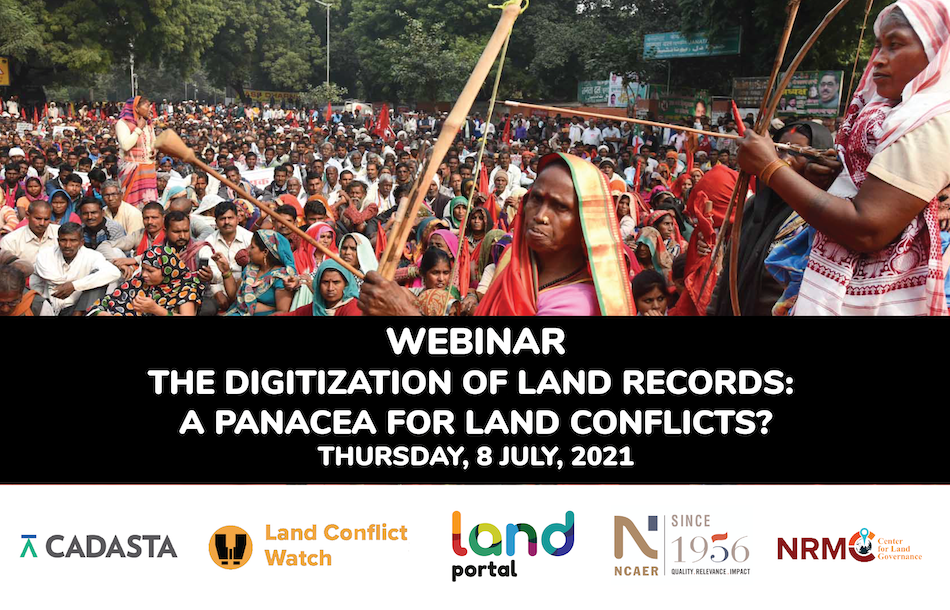Organized by the Cadasta Foundation, Land Conflict Watch, the Land Portal Foundation, National Council of Applied Economic Research (NCAER) of India, and NRMC Center for Land Governance, the webinar "The Digitization of Land Records: A Panacea for Land Conflicts" provided an in-depth look at the critical role digitization of land records plays in addressing land disputes in India.
Moderator: Pranab Ranjan Choudhury, NRMC Center for Land Governance
Panelists:
-
Deepak Sanan, NCAER
-
Kumar Sambhav, Land Conflict Watch
-
Teddy Kisembo, Urban Action Lab at Makerere University, Uganda
-
Frank Pichel, Chief Programs Officer, Cadasta Foundation
Kumar Sambhav, an expert in land rights, outlined the significant potential of digital land records to enhance transparency, reduce disputes, and streamline property transactions. He highlighted the challenges faced in traditional land record management, such as outdated records and corruption, and how digitization can mitigate these issues. Sambhav also discussed the importance of community involvement in the digitization process to ensure that the system is accessible and beneficial to all, particularly marginalized groups. He emphasized that technology alone cannot solve land conflicts; a holistic approach that includes legal reforms and public awareness is essential.
Frank Pichel's contribution focused on the global perspective of land record digitization, drawing comparisons with initiatives in other countries. He detailed the importance of designing inclusive digital systems that protect the rights of all citizens, especially vulnerable populations. Pichel shared best practices from around the world, including the importance of clear legal frameworks, stakeholder engagement, and the integration of technological solutions with traditional land management practices. His insights shed light on the potential pitfalls and success factors of digitization projects, advocating for a balanced approach that considers both technological and human factors.
Teddy Kisembo shared insights from Uganda's experience with digitizing land records, focusing on the impact on governance and dispute resolution. She highlighted how digitization has facilitated faster, more transparent land transactions and improved access to land information for the public. Kisembo discussed the challenges encountered, such as resistance from traditional landowners and the need for extensive public education campaigns to increase acceptance of the digital system. His contribution underscored the importance of adapting digitization efforts to local contexts and the potential for technology to transform land administration in developing countries.
Deepak Sanan advocated for policy and legal reforms to support digitization efforts, stressing that technology must be complemented by supportive legal frameworks to be effective. He discussed the role of government in facilitating digitization, including the need for investment in infrastructure and training. Sanan highlighted examples of successful policy reforms that have enabled digitization and improved land governance, calling for a proactive approach to address the legal and regulatory challenges of digitization.
Charu Jain's remarks centered on integrating digital land records with broader digital governance initiatives. She discussed how digital land records can be a cornerstone of smart governance, enabling better service delivery and increased government transparency. Jain highlighted the synergies between digital land records and other e-governance projects, such as digital identification and property tax systems. She emphasized the need for a cohesive digital strategy that leverages land records to enhance overall governance and public trust.
As the Moderator, Pranab Choudhury delved into the technical intricacies of implementing digital land records, emphasizing the critical role of accurate data collection, storage, and management. He discussed various technologies used in digitizing records, such as geographic information systems (GIS), and their impact on improving land record accuracy and accessibility. Choudhury highlighted the challenges of digitization, including the need for robust cybersecurity measures and the potential for technological disparities to exacerbate existing inequalities. He called for ongoing capacity building and technological innovation to ensure that digitization efforts are sustainable and equitable.
The webinar concluded that while digitization offers significant benefits in resolving land conflicts and improving land governance, it requires comprehensive strategies that include legal, technical, and community engagement components to ensure it benefits all, especially marginalized communities. The discussion underscored the necessity of a multi-faceted approach that addresses the challenges of digitization while leveraging its potential to transform land administration.

